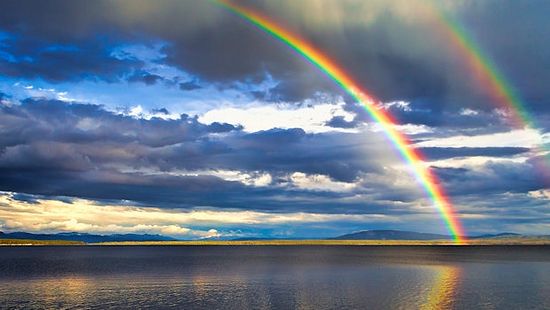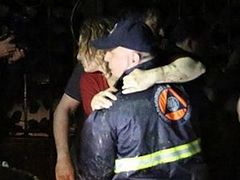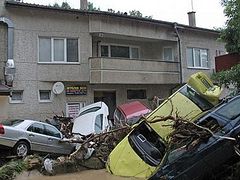Source: Orthodox Christian Network
October 6, 2015
For the first several days of October, South Carolina was hit by a storm of epic proportions. Boone Hall Plantation, which is 3 miles from my house, received 26.88 inches of rain in three days time. While numbers vary according to temperature, that would be the equivalent of 268 inches—22 feet—of snow. Charleston, SC, received by far the largest amount of rain, but, it seems, Columbia, SC, took the worst beating. Houses are inundated. Bridges are damaged. Commercial spaces collapsed. An 80-mile section of Interstate 95 has been closed for two days, as have been the Charleston area schools. Downtown, kayakers are paddling the streets. One video showed a young man wake-boarding behind a pickup truck down a long rural driveway.
The devastation is great, resultant from a storm with 1 in 1000 odds in a given year.
Thank God for the tireless public servants and generous neighbors who reach out and help one another in these difficult times.
I turned to the Great Book of Needs to find prayers In Time of Flood, and found a Molieben (“Prayer Service”) adapted from one served on November 14, 1824, in the great flood of St Petersburg, Russia. Striking (maybe it should not be!) is the penitential nature of this remarkable service. The Epistle reading is from Hebrews 12:6-13, and begins, For the Lord disciplines him whom he loves, and chastises every son whom he receives. The Gospel lesson is Matthew 8:23-27, when the disciples were in the boat, Jesus was asleep, and they feared perishing. Why are you afraid, O you of little faith! replies the Lord.
The main prayer for the service is the length of a newspaper essay—nearly 800 words. It is filled with the most humbling and repentant language. Here is a sample:
We have sinned, we have transgressed, we have been iniquitous, we have forgotten Thy commandments and we have walked with evil thoughts; and we have lived as ones unworthy of our calling and the Gospel of Thy Christ, and we have not imitated His Holy Passion with which He wearied Himself for us. For we have become a reproach to the name of Christians and the Church, we have fled away, all of us, we have become unprofitable, no one has given alms, or wrought justice and righteousness; none, not even one (PRAYER -Time of Flood).
Is this some sort of Pat Robertson or televangelist way of blaming this awful flooding and terrible inundation on the sins of South Carolinians? Some might see it that way.
But the general trajectory of all the prayers associated with so-called natural disasters or “acts of God” is that they are occasions to remember our smallness. To be called to humility. To remember that God is God and we are not.
It is not that if Governor Haley would have defunded Planned Parenthood (I wish she would!), then we could have averted this disaster. The correlation of sin-to-consequence is neither direct, nor one-to-one, in a similar way to the question of the man born blind: “Who sinned, this man or his parents that he was born blind?” No, rather, it is an opportunity to return our full trust and confidence in God, and indeed to inspect our lives for wickedness—and to turn from it and live.
God himself promised never to destroy the earth again by flood. Of that we can be confident. But in the midst of our comparisons of our South Carolina to floods of Noah-like proportions, we ought to remember indeed why the floods were brought on the earth:
The Lord saw that the wickedness of man was great in the earth, and that every imagination of the thoughts of his heart was only evil continually. And the Lord was sorry that he had made man on the earth, and it grieved him to his heart (Gen. 6:5ff).
Has the inclination of man’s heart changed? We don’t have to look even outside of our own heart to see that “improvement”, moral or otherwise, is not one of the marks of post-modern man. Selfishness and self-indulgence have been canonized and marked for export!
And despite all of our advanced capacities—even to include knowing at what precise hour rains will begin and cease to fall, we cannot stop a drop of rain from falling from the sky. Even our efforts to contain waters will eventually fail if the Lord of the heavens opens heaven’s floodgates. Note the bridges and dams and washed out roads disintegrating before us, some melting like butter in their collapse—by sharp contrast to the hours and hours of toil, labor, and planning necessary to design and build them (not to mention the labor to gather and prepare the raw materials to do so!).
In the Prayer In Time of Flood is a reference also to the Book of Job. O how utterly humbling and awesome!
Then the Lord answered Job out of the whirlwind: “Who is this that darkens counsel by words without knowledge? Gird up your loins like a man, I will question you, and you shall declare to me. “Where were you when I laid the foundation of the earth? Tell me, if you have understanding. Who determined its measurements—surely you know! Or who stretched the line upon it? On what were its bases sunk, or who laid its cornerstone, when the morning stars sang together, and all the sons of God shouted for joy? “Or who shut in the sea with doors, when it burst forth from the womb; when I made clouds its garment, and thick darkness its swaddling band, and prescribed bounds for it, and set bars and doors, and said, ‘Thus far shall you come, and no farther, and here shall your proud waves be stayed’? “Have you commanded the morning since your days began, and caused the dawn to know its place, that it might take hold of the skirts of the earth, and the wicked be shaken out of it (Job 38:1-13).
For every amazing act of architecture and design, we have never caused a single drop of water to fall from heaven. For every remarkable advance in prognostication, we cannot calm the waters. Every good and perfect gift is from above!
God did spare Noah and his family, and the pairs of animals, and it is well worth reading those three chapters of Genesis, if for no other reason than to be reminded of God’s great love for his creatures and creation. God gave a sign of that love in the rainbow. (How sad that the mark of God’s deliverance of man from death and destruction has been co-opted by those who demand now to call evil, good!) The rainbow is a promise and a reminder. It is a promise never to destroy the earth by flood again. It is a reminder of why the earth was flooded to begin with!
And what did Noah do just after the waters receded? He departed from the Ark, built an altar, and made an offering to the Most-high God. He was saved and he gave thanks.
The Christian knows this salvation through Jesus Christ in Holy Baptism. We do not wait for the Lord to destroy us in our sins. He doesn’t desire the death of anyone—but that we would turn and live! We immerse one another in the water to drown the old man voluntarily. We arise out of the baptismal waters—waters which grant earthly death, but heavenly life—to build an altar to God called “my life”, which is given as a daily offering of thanks for salvation in the Ark of the Church. Whatever possessions I possess, I possess as a temporary, temporal gift from God. Whatever breath I breathe, I breathe as a gift of God. Whatever life I live, I live as a gift from God.
The floodwaters and rains are a reminder that life and all it contains is a gift from above.
Do I act like it?




